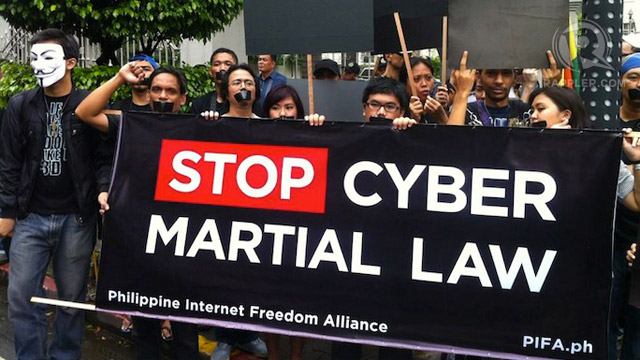SUMMARY
This is AI generated summarization, which may have errors. For context, always refer to the full article.

MANILA, Philippines – The oldest voluntary organization of lawyers in the country asked the Supreme Court on Friday, October 5 to bar the government from enforcing the Cybercrime Prevention Act of 2012, saying it contains provisions that violate individual freedom.
The Philippine Bar Association, which was founded in 1891, said sections 4(c)(4), 5, 6, 7, 12 and 19 of Republic Act 10175 violate constitutional rights to freedom of speech, freedom of expression and due process.
Sec 4 criminalizes online libel, while Sec 5 penalizes the abetting of commission of cybercrimes. Sections 6 and 7 include all crimes in the Revised Penal Code under the Cybercrime law and increase the corresponding penalties to one degree.
Sec 12 authorizes state agents to collect real-time traffic data, while Sec 19 grants the DOJ the power to shut down websites that contain harmful data based on prima facie evidence.
The lawyers’ group said the provision on online libel is “vague” as it does not specify what constitutes “publication” of libelous remarks online, hence creating a “chilling effect.”
They said the same could be said of Sections 6 and 7, as “abetting or aiding” in the commission of a cybercrime is not properly defined.
They also pointed out that the sections that increase the penalty to all crimes to a degree higher discriminate against netizens.
As for Sec 12, they said the collection of real-time traffic data is violative of the right to privacy because it allows law enforcement agencies to collect data even without a court order.
“Section 12 of the Cybercrime law allows a warrantless search and seizure of data involved in the transmission of communication,” the group said.
This is the 11th petition to be filed against the Cybercrime Prevention Act, which took effect on October 3 and was signed into law by President Benigno Aquino III on September 12.
The SC is expected to tackle all petitions on October 9. – Rappler.com
More on the Cybercrime law:
Add a comment
How does this make you feel?





There are no comments yet. Add your comment to start the conversation.